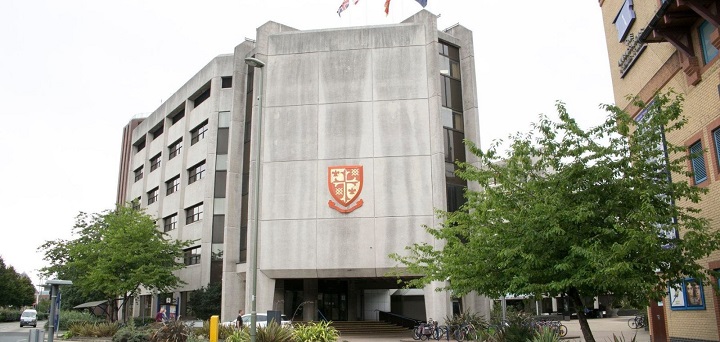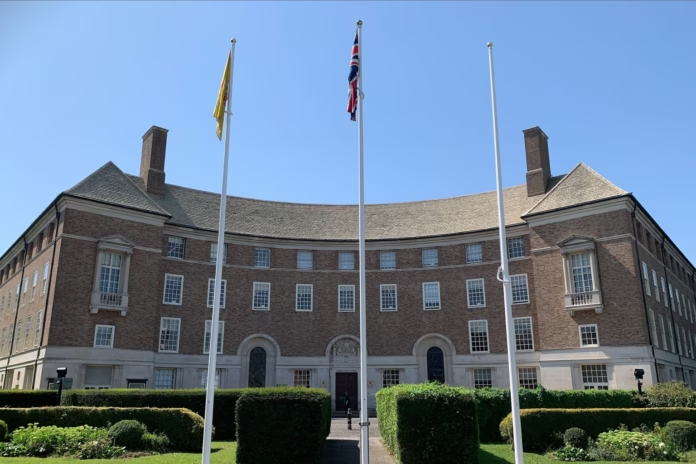Woking Borough Council has been issued with a section 114 notice as it faces an “unbridgeable” £1.2bn funding deficit.
The section 114 notice issued by Brendan Arnold, Woking’s interim director of finance and section 151 officer, outlined that the council’s debt portfolio stood at £1.8bn at 31 March 2023 as a result of various loans drawn down from the Public Works Loan Board (PWLB).
This has meant that, against Woking’s core funding of just £16m available in the 2023/24 financial year, the authority faces a deficit of £1.2bn.

In his report, Arnold said: “The existence of the factors set out in this report, render the forward budget shortfalls unbridgeable; there is no prospect that the council will balance its budget in 2023/24, 2024/25 or the successive years without external intervention on a very large scale.”
Arnold stated that at 31 March 2023 Woking had an estimated negative general fund balance of c.£350m. He suggested that the general fund balance at this date is forecast to “more than triple” at around £1.2bn by 31 March 2024.
The issuance of the section 114 notice comes as Woking Borough Council was placed under government intervention on 25 May following the publication of an External Assurance Review, which made clear the scale of the financial and commercial risks facing Woking.
Julie Fisher, Woking Borough Council’s chief executive, said: “The issuing of a section 114 notice is a very serious matter that rightly reflects the scale and breadth of the acute financial situation facing the council.
“Through the commissioning of an independent financial review of the council’s borrowing and loans to its companies, we have a comprehensive understanding of our severe financial position which informed the section 151 officer’s decision to issue a section 114 notice.”
Fisher added that the council is required to meet within 21 days to consider the s114 notice and that Woking is currently preparing a response, which will be discussed at an extraordinary meeting of the full council on 20 June.
15th Annual LATIF & FDs’ Summit – 19 September 2023
250+ Delegates from Local Government & Investment
£1.3bn debt from subsidiary companies
In the section 114 notice, Arnold also stated that £1.3bn of the PWLB loans were principally given to Woking’s subsidiary companies of Victoria Square Woking Limited and ThamesWey Group.
It was reported in late May that Woking Borough Council faced a £490m write-down of its assets after Victoria Square Woking Limited’s latest valuation revealed “devastating” financial losses.
In addition, the External Assurance Review outlined that the regeneration scheme of both Victoria Place and the Sheerwater housing stock account for the majority of the council’s debt, which is expected to rise to £2.4bn by 2025/26.
Ann-Marie Barker, Woking Borough Council’s leader, added: “My administration has been very clear about the huge financial challenges facing the council due to the legacy of inherited debt.
“The notice makes clear the true scale of these challenges which are so significant that the council cannot simply deal with them on its own. We must work in partnership with the whole of government and its agencies to support us in delivering a robust Improvement and Recovery Plan.
“I understand the concerns and questions this will raise, and I am committed to maintaining transparency with residents and partners as we progress through this unsettling time.
“Difficult decisions will lie ahead as we seek to balance the council’s budget and address the unaffordable debt.”
Stark warning from CIPFA
Rob Whiteman, CIPFA’s CEO, warned that the issuance of Woking’s section 114 notice highlights the “risks associated with borrowing on this scale”.
He said: “Borrowing must always be proportionate and this is an extreme example of what happens when that principle is ignored.
“This is a dark day for everyone in the local government sector and there is no doubt that the framework for accountability and improvement has failed. Further detailed investigation is needed, but based on what has been reported, the areas of weakness are financial management, governance, leadership, and scrutiny and challenge.”
Whiteman added that “clearly” Woking didn’t follow the controls put in place by the Prudential Code when the authority undertook the borrowing for its regeneration schemes.
“We need to work harder to prevent this happening again and understand how this small district council was able to operate under the radar for so long.
“Much of local government has a proud heritage in local regeneration, but their involvement is selective and proportionate, and aligned with strong public sector financial management and governance. It seems that this effective decision-making framework was lacking at Woking Borough Council,” Whiteman said.
An analysis of Brendan Arnold’s review of the council’s financial affairs, and the factors which led to the issuance of the section 114 notice, can be read here.
—————
FREE weekly newsletters
Subscribe to Room151 Newsletters
Follow us on LinkedIn
Follow us here
Monthly Online Treasury Briefing
Sign up here with a .gov.uk email address
Room151 Webinars
Visit the Room151 channel














